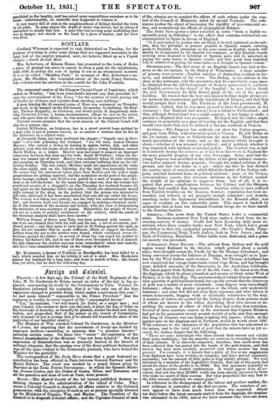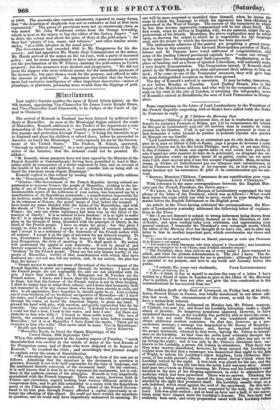,iirtigu Rut ifolnuld.
Titastoz.—A few days ago, the Colonel of the Sixth Regiment of the Line, M. De Gardarens de lloisse, issued an:order of the day to his re- giment, announcing its recall by the Government to Paris. Colonel De Ciardarens informed his regiment, that it is " the only one of the four regiments; charged to practise firing which makes a movement this year ": he had made himself " responsible to the Prince President" that the regiment is worthy in every respect of the " unexampled Savour."
"Yes," he exclaims, "we will march [to Paris] as a single man; your Colonel, who swears to show youthe.road, to plant the lag of Order on the.barricade of. Anarchy, aa formerly.he planted, amidst the dead and dying, bullets, and grape-shot, that of the nation on the breach of Constantine, only demands of you to avenge him if'he should fall beneath the shots of the parricides of our beautiful country,"
The Minister of War rebuked Colonel. De Gardarens, in the ifeniteur de -Arne, for imputing that the movements of troops are decided by improper motives—according to opinions that "a peculiar bravery ' animates certain corps. On these two ." errors" the-expression of the formal dissatisfaction of the Minister " has not been delayed." But that expression of dissatisfaction was so precisely limited to the 'breach of military etiquette, that the-passing over of the fierce political declamation was all the more evident to the Democratic journals, who have lashed the Minister for his partiality. The correspondent of the :Daily News states that a moat ,fraternalre- conciliation has been effected in Paris between General Narvacz and Sir Henry Bulwer. The event was marked by a grand dinner given by Namara at the Trois Freres Proveneaux ; at which the Spanish Minis- ter, Donoso Cortes, and the Dukes of Game, Ribes, and Tamames, and all the grandees and dons of note at Paris, were present.
Erens.—The .1Ifadrid 'Gazette of the let instant published decrees or- daining changes in the administration of the island of Cuba. They create a Cdonial Connell to despatch all affairs relative to the Colonial possessions, NySth the exception of such as are at present specially -directed hy- the Ministers of Finance War, -and Marine. The President of the Council is to deapatali Colonial affairs ; and the Captains-General .of each of the colonies are to conduct the affairs of each edionyunder the cen- ts& of thwCouneil of Ministers, aided by special Councils. The ordi- nances profess the object of increasing the rapidity of governmental ac- tion, and-neutralizing the effects of geographic& distance. The .Daily News quotes a letter received in town "from a highly re- spectable party in Gibraltar," to the effect that customs-relaxations are contemplated by Spain in favour of England.
"It is anticipated by parties who are likely to be-well informed on the sub-
gt, -that the privilege at present granted to Spanish vessels carrying ocla -to England, viz. admission on the same terms as English vessels, will shortly be reciprocated by the Spanish-Government; so that English vessels arriving from England or Gibraltar at Spanish ports will be admitted on paying the same duties as Spanish vessels, and that goods thus imported will be admitted onpaying the same duties as if brought in Spanish vessels."
SWITZERLAND.—The first atone of an English church was laid at Gas- neva on the let instant, by the Bishop of Winchester. A large number of persons were present—English families of distinction resident in Ge- neva, and inhabitants of the town. The Bishop, in his address at the olose of the oeremony, told the spectators, that five-and-thirty years since he obtained from the old Government of Geneva permission to celebrate an English service in the chapel of the hospital ; he now had to thank the new Government for their liberal grant of the site of the present building. He, trusted that the best and kindest feelings might always ex- ist between hie countrymen and the inhabitants of Geneva, and that God would prosper their work. The President of the local government, M. Moulinie, replied, that he was most pleased to have been present at the ceremony ; that England had always been a friend to Switzerland ; and that, although Switzerland was a small country, it was happy to make a present to England that was acceptable. He hoped that the edifice might continue in perpetuity as a place of worship for the English, and that they would even more than ever be induced to become residents at Geneva.
AUSTELL—The Emperor has suddenly cut short his Italian progress, anclgone from Milan, with unwonted speed, to Vienna. He left. Milan on the 1st instant, and was at Sehonbrunn the next day. There has been much speculation on the event, and on the motives which brought it about,—whether it was personal or political ; and if political, whether it was connected with internal or external policy. The weather was as bad in Lombardy during the reviews as it has been this week in England dim the more peaceful progress of our own Sovereign. Some said that the young Emperor was mortified at the failure of his great military manoeu- vres before eminent foreign generals, through the soaked softness of the ground, and had run home in a pet : others say that he had divqned the sombre spirit of unwelcome which filled the hearts of his Italian sub- jects, and had hastened home in political mistrust : some of the Vienna correspondence asserts that intestine divisions in his Cabinet needed the weight of his opinions to suppress them : last of all, it is re- ported that grave complications between his Cabinet and the Ottoman Ministry had recalled him homewards. Austrian subjects have suffered from Turkish troubles on the Bosnian frontier ; reparation has been de- manded, and refused, or not promptly enough conceded ; and Austria, smarting under the diplomatic discomfiture in the Kossuth affair, was eager to retaliate on this vulnerable point. This report is backed 'by statements that at least ten thousand Croatian troops are on their march to the Bosnian frontier.
Ampares..—The news from the United States bodes a commercial crisis. Business matters at New York were under a elond from the in- creasing scarcity of money. Credit had been becoming daily more re- stricted, when three country banks near New York, which had a greet circulation in that city, suspended payment,—the People's Bank, Pater- son, the Commercial Bank, North Amboy, both in New Jersey,; and the Bank of Salisbury, Maryland. Other banks were distrusted,-and a.getuso ml anxiety was prevalent.
AUSTRALIAN GOLD REGION.—The advises ifrom Sydney mid the gold region round Bathurst in the interior, which arrived about a month since, were brought across the Pacific by the Sir Thomas Arbuthnot ; and being conveyed across the Isthmus of Panama, were brought on to lion- don by the West Indian snail-steamer. The Sir Thomas Arbuthnot has now completed her voyage homewards round Cape Horn, and has brought more detailed accounts of the discoveries in the Australian California. The latest papers from Sydney are of the 9th June ; the latest.news from the diggings, which lie about a hundred and-twenty or thirty miles West of Sydney, is to the Slat May. The accounts make it certain that-an extraordi- nary quantity of gold had been found, but equally certain that the-discovery of gold was a matter of great vicissitude : some diggers were exceedingly fortunate ; others, the greater proportion of the whole, only moderately fortunate ; and some few did not clear their expenses, and were driven to return homewards, begging work or charitable subsistence by the way. A number of letters are quoted by the Sydney Empire, from persons most of whom are known to the editor, describing their own success or de- scribing the success of others of which they had ocular demonstration. Several of these accounts concur in the statement that Captain Milldams. had got in.his possession twenty pounds weight of gold, and that amongst this heap of treasure was one lump weighing 44 ounces ; which, at the market-rate on the diggings and in Bathurst, would be worth about 1501. With reference to the character of the population that has adjourned to the mines, and to the total yield of gold that the miners have as yet se- cured, the Sydney -Empire has the following.
"There are some individuals who blaze abroad their success and exhibit their gains exultingly ; but the majority are cautious in revealing the result of their labours. It as shrewdly suspected, therefore, that much more has been collected than has passed into the hands of the gold-buyers, and that secrecy has been most carefully preserved just where success has been greatest. For example, it is known •that a party of five or six magistrates from Bathurst have been-working in company, and have proved eminently successful; but the amount of their gains is kept straitly private. We were informed by a member of the legislative Council, that one of this; very bad stated his share of the profits to be 2000/. But this statement depended on report, and therefore wanted confirmation. It would appear from all ac- counts, that not less .than 20,0001. worth has been already procured by those who make no secret of their success. But what proportion this may bear' to the total amount collected, we cannot guess."
In reference to the derangement of the labour and.produce market, the new evidence is corrective of the first accounts. The numbers of mi- ners appear to have heen much fewer than was supposed. About ten days lefere the latest accounts started from the diggings, the atumber was estimated to be ,1500, and at the latest moment 'thew were set down
at 2000. The accounts also contain statements, repeated in many forms, that "the desertion of shepherds was not so extensive as had at first been represented." The prices of provisions were not so enormously risen as was stated. Mr. John Woodward writes from the Orange township, which is next to the mines, to beg the editor of the Sydney Empire " not to drive the colony mad about the price of flour at the gold-mines "; for they had "plenty of tea, sugar, and tobacco," and other similar neces- saries, " at a little advance on the usual prices." The Government had awarded 6001. to Mr. Hargreaves for his dis- covery • and had appointed Mr. Hardy their Commissioner at the mines. Mr. Hardy arrived at the mines on the 1st June, with a party of mounted police ; and he seems immediately to have taken some measures to carry out the proclamation of Sir W. Fitzroy claiming the gold-mines as Crown property; but his measures were discreet and progressive. " He did not press the diggers who were without means for the immediate payment of the licence-fee, but gave them a week for the purpose, and offered to take the amount in gold-dust." An impression prevailed that the Govern- ment had exclusive intelligence of other important discoveries—mines of plumbago, or platinum, promising more wealth than the diggings of gold.



























 Previous page
Previous page